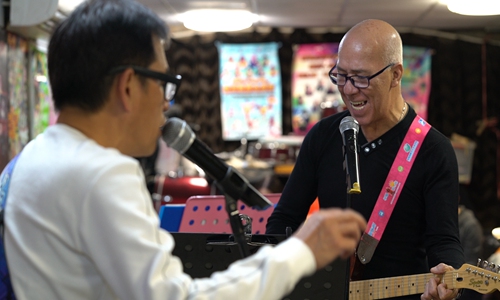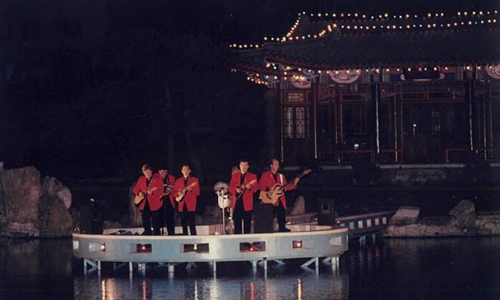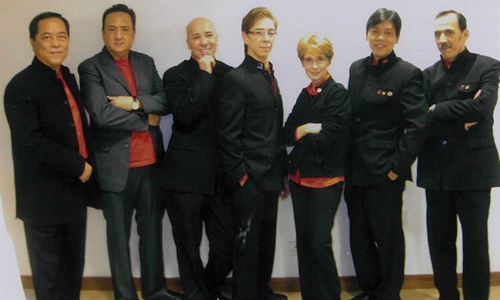ARTS / CULTURE & LEISURE
Macanese band seeks to pass on Macao’s unique mix of Chinese and Portuguese cultures
Keeping tradition alive

Filomeno Jorge (right) and a fellow Tuna Macanese band member practice at KEN TIN Association in Macao on December 11. Photo: Cao Siqi/GT
They are the Macanese - an East Asian ethnic group that originated in Macao in the 16th century, consisting of people of predominantly mixed Chinese and Portuguese decent.
During the island's colonial period, many of the Portuguese traders married Chinese women. Their descendents grew up in Macao and developed their own distinct food, culture, and language. This mixed-race group now makes up less than 1 percent of Macao's population and their language, Patua, is dying.
Patua is a Portuguese-based dialect with a substrate from Cantonese. In 2009, the new edition of UNESCO's Atlas of the World's Languages in Danger classified Patua as a "critically endangered" language. The Atlas put the number of Patua speakers at 50 as of the year 2000.
Although the Macanese community is going to great lengths to save this language, it is mainly kept alive through literal notation, plays and songs.
Tuna Macanese is a band established in 1935 that originally consisted of more 30 Macanese members. It is currently one of the most prominent stars when it comes to efforts to preserve the culture by adapting the language into popular music.
Wearing unified red Polo shirts, the Tuna Macanese band, now consisting of seven members, just finished a performance at a musical carnival in the neighboring city of Zhuhai, South China's Guangdong Province.
Filomeno Jorge, the band's leader, has been looking for new blood for his band.
"All of us in the band are over 60," he told the Global Times.
"After we die, our music will die, and I can't let that happen."
According to the 62-year-old composer and guitarist, since Macao returned to China in 1999, the city has maintained its multi-cultural characteristics. The band's songs have also been adapted into Putonghua, spreading Macanese culture to the Chinese mainland.

Tuna Macanese during performance Photo: Courtesy of Tuna Macanese
Long historyWhen Tuna Macanese was founded in 1935, it was a busking group that also performed at festivals. The band's performances had strong Portuguese characteristics, with members playing the mandolin, banjo, Portuguese guitar, accordion and percussion instruments. However, the band ceased to play during World War II, only becoming active again around the early 1970s.
Currently, the group, composed of third generation members, has been widely recognized by local citizens and the regional government and they have been invited to perform in various cities. While their music has become more modern, the band still mainly focuses on Portuguese music. Apart from singing in Patua, they also perform songs in English, Putonghua and Cantonese.
Jorge worked in the police for 22 years, after which he worked as a security operations manager at MGM Grand, a major casino operator in Macao. After retiring, he began to focus more energy on his band.
The other six members of the band still work, some at the local postal department, others at a bank and at the consulate.
They practice at the KEN TIN Association, a non-governmental social organization, in the downtown area of the Macao Peninsula once a week.
According to Jorge, before Macao was handed over from Portugal, they were worried that they would lose a free place for them to practice and some of the band members may leave and so they would have to disband.
They sent a letter to the government and got a reply that they could apply for tax exemptions, which allowed them to stay together.
In 2006, the band's song "I love Macao's sub-islands" won the award for excellence at the International Chinese Music Competition held by Macao's Chinese Musicians' Association. The following year, Tuna Macanese was once again awarded with the Medal of Cultural Merit by the government of the Macao Special Administrative Region (SAR).
In 2008, Jorge and his band members were honored by then chief executive of the Macao SAR Edmund Ho Hau Wah, who acknowledged their efforts in promoting local culture and art.

Tuna Macanese Photo: Courtesy of Tuna Macanese
Looking to the futureWhen Macao was handed back to China in 1999, many of Jorge's family members immigrated to the UK or Portugal, but he stayed.
"Just for one reason, I was born in Macao and I love my city," he said.
"All I have done has been for the Macao people, not only the Macanese. I hope I can make a difference in helping the government to disseminate Patua culture," he stressed.
Born and raised in Macao, Jorge speaks Cantonese but cannot read or write Chinese characters. When he composes a new repertoire, he often asks some friends to write the lyrics in Chinese for him.
Jorge noted that the band is facing two main difficulties. The first is that they don't have their own place to practice. The second, and probably most critical, is that they have not found any young members to pass down their music too.
According to Jorge, today's youth are not interested in Patua music and think that it is old-fashioned. Hence, it has become very difficult for the band to nurture the next generation.
"Many Macanese of the new generation don't even know this language exists," Jorge said.
Despite this dire situation, the band members still hope that the Macao government and society will still remember their music and this culture in the future.
Li Qiaoyi contributed to this story



